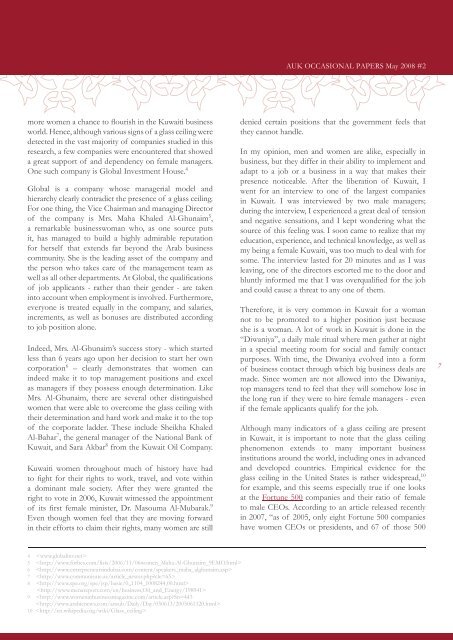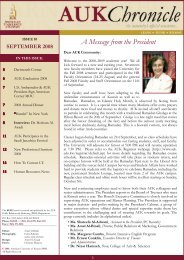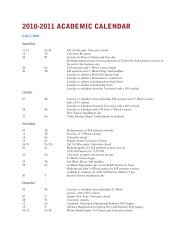more women a chance to flourish in the Kuwaiti businessworld. Hence, although various signs of a glass ceiling weredetected in the vast majority of companies studied in thisresearch, a few companies were encountered that showeda great support of and dependency on female managers.One such company is Global Investment House. 4Global is a company whose managerial model andhierarchy clearly contradict the presence of a glass ceiling.For one thing, the Vice Chairman and managing Directorof the company is Mrs. Maha Khaled Al-Ghunaim 5 ,a remarkable businesswoman who, as one source putsit, has managed to build a highly admirable reputationfor herself that extends far beyond the Arab businesscommunity. She is the leading asset of the company andthe person who takes care of the management team aswell as all other departments. At Global, the qualificationsof job applicants - rather than their gender - are takeninto account when employment is involved. Furthermore,everyone is treated equally in the company, and salaries,increments, as well as bonuses are distributed accordingto job position alone.Indeed, Mrs. Al-Ghunaim’s success story - which startedless than 6 years ago upon her decision to start her owncorporation 6 – clearly demonstrates that women canindeed make it to top management positions and excelas managers if they possess enough determination. LikeMrs. Al-Ghunaim, there are several other distinguishedwomen that were able to overcome the glass ceiling withtheir determination and hard work and make it to the topof the corporate ladder. These include Sheikha KhaledAl-Bahar 7 , the general manager of the National Bank ofKuwait, and Sara Akbar 8 from the Kuwait Oil Company.Kuwaiti women throughout much of history have hadto fight for their rights to work, travel, and vote withina dominant male society. After they were granted theright to vote in 2006, Kuwait witnessed the appointmentof its first female minister, Dr. Masouma Al-Mubarak. 9Even though women feel that they are moving forwardin their efforts to claim their rights, many women are stilldenied certain positions that the government feels thatthey cannot handle.In my opinion, men and women are alike, especially inbusiness, but they differ in their ability to implement andadapt to a job or a business in a way that makes theirpresence noticeable. After the liberation of Kuwait, Iwent for an interview to one of the largest companiesin Kuwait. I was interviewed by two male managers;during the interview, I experienced a great deal of tensionand negative sensations, and I kept wondering what thesource of this feeling was. I soon came to realize that myeducation, experience, and technical knowledge, as well asmy being a female Kuwaiti, was too much to deal with forsome. The interview lasted for 20 minutes and as I wasleaving, one of the directors escorted me to the door andbluntly informed me that I was overqualified for the joband could cause a threat to any one of them.Therefore, it is very common in Kuwait for a womannot to be promoted to a higher position just becauseshe is a woman. A lot of work in Kuwait is done in the“Diwaniya”, a daily male ritual where men gather at nightin a special meeting room for social and family contactpurposes. With time, the Diwaniya evolved into a formof business contact through which big business deals aremade. Since women are not allowed into the Diwaniya,top managers tend to feel that they will somehow lose inthe long run if they were to hire female managers - evenif the female applicants qualify for the job.Although many indicators of a glass ceiling are presentin Kuwait, it is important to note that the glass ceilingphenomenon extends to many important businessinstitutions around the world, including ones in advancedand developed countries. Empirical evidence for theglass ceiling in the United States is rather widespread, 10for example, and this seems especially true if one looksat the Fortune 500 companies and their ratio of femaleto male CEOs. According to an article released recentlyin 2007, “as of 2005, only eight Fortune 500 companieshave women CEOs or presidents, and 67 of those 50074 5 6 7 8 9
8companies don't have any women corporate officers.” 11This pattern is also evident in Europe, where a surveyconducted by the European Professional Women'sNetwork in 2006 found women to constitute only 8.5 percent of corporate boardroom seats in Europe. 12In Kuwait and the G.C.C., the glass ceiling is certainlyno exception to the general trend. Although femalesand males in Kuwait do enjoy equal opportunities foreducation, in most cases such educational opportunitiesare offered to them for free. Thus, it is only when theyenter the workforce that gender discrimination becomesapparent. This discrimination is surprising for a numberof reasons. First, it is a known fact that most womenin Kuwait graduate from university with a much higherGrade Point Average than do their male colleagues.Second, many women pursue higher levels of educationand academic qualifications than do men, and this maybe due in part to the boundaries imposed on them bylocal culture. Such boundaries allow women less freedomto travel and to pursue challenging opportunities, and sothey focus on their education. I personally believe thatthis is the main reason why most organizations prefer tohire male managers, and with time I have also realized thatit is harder for females to reach high managerial positionsbecause of our society’s perspective of working women.Ultimately, these difficulties which women face helpeddevelop the glass ceiling in Kuwait.Now, one might wonder just how the glass ceiling maybe eliminated in Kuwait and around the world. In myopinion, companies must try and embrace the open doorpolicy if they are to achieve this end. Top managers shouldsend a clear message to all managers and supervisors thatthe company will not tolerate any form of discriminationbased on gender. Moreover, all employees should have theright to see their evaluation, to sign it, and to challenge ifthey feel necessary. Indeed, all of these changes are of vitalimportance, especially considering that that a clear codeof conduct in the workplace is quite lacking in Kuwait. 13In spite of all the challenges, Kuwaiti women today areeager to pursue a career in management because theybelieve that they are capable of planning, organizing,leading, and controlling. Most importantly, they recognizethat being a manager is a highly rewarding opportunityand a great learning experience for any women or man. 14ConclusionAlmost everyone interviewed as part of this study feltthat a glass ceiling exists in Kuwait in general and in thegovernment sector especially. That is why, in my opinion,the government sector is very ineffective in Kuwait. Theglass ceiling phenomenon in Kuwait can be summarizedby the word "WASTA", and not having the right"WASTA" can definitely be a barrier for promotion totop corporate levels. 15 Furthermore, the majority of theobservations made in this study confirm the prevalenceof a stereotypical attitude towards women – one thatreflects a general lack of acceptance, and even resistance.Yet, those who, like Mrs. Maha Al-Ghunaim, do makeit to the top of the managerial hierarchy often makeoutstanding and lasting contributions to managementand serve as the much-needed role models of femininesuccess in the Arab world today. And it may be truethat, at the present time, there are not enough womenmanagers here in Kuwait; yet, with the country’s boomingeconomy and some great strides being made in the areaof development, the number of women promoted to topmanagement positions may well rise higher than any glassceiling which may exist at present.During the past five years, there has been an increase inthe number of women in managerial positions, and thishas been true not only in Kuwait but also in countrieslike the United States, something that might provide somehope that the glass ceiling will decrease with time andawareness, especially since people are becoming more andmore aware of this problem.The best way to prevent any unfair practices or biaswhen it comes to promotion – which are not uncommonworldwide, let alone in Kuwait - is to clearly list thequalifications required for one, male or female, toreceive promotion, and to make these criteria public toall employees to ensure that all managers are given anequal chance and that promotion decisions are not madeaccording to supervisors’ subjective preferences.So, in the end, yes there are obstacles in Kuwait that preventwomen from being promoted, especially in governmentsector, but less so in the private sector; yet, ultimately, onemust take to not be merely concerned with gender whenlooking at the top of the corporate ladder, but also to11 12 13
- Page 2 and 3: About AUK Occasional Papers:The AUK
- Page 4 and 5: higher education is distinguished b
- Page 6 and 7: The Impact of a Glass Ceilingon Wom
- Page 10 and 11: consider other factors such as the
- Page 12 and 13: academically unprepared…you must
- Page 14 and 15: EmotionalSignificant variations in
- Page 16 and 17: Advising and OrientationOther impor
- Page 18 and 19: etention. However, in addition, the
- Page 20 and 21: Hadi and Llabre (1998) assessed int
- Page 22 and 23: the event was encoded in parallel a
- Page 24 and 25: Public Health Impacts of Iraq’s 1
- Page 26 and 27: college work and have inadequate pr
- Page 28 and 29: memorization and repetition. This a
- Page 30 and 31: other in the pursuit of higher grad
- Page 32 and 33: for quality assurance, an organizat
- Page 34 and 35: RethinkingEntrepreneurship:Integrat
- Page 36 and 37: This type of training leads to enha
- Page 38 and 39: In short, Mount Allison students ha
- Page 40 and 41: Joplin, L. (1995). On defining expe
- Page 42 and 43: Figure 1. ExperientialEntrepreneurs
- Page 44 and 45: Kuwait - satellite television, cult
- Page 46 and 47: ReferencesAbt, V. & Seesholtz, M. (
- Page 48 and 49: interest in continuing to manipulat
- Page 50 and 51: Though corruption poses fundamental
- Page 52 and 53: A Cross-Cultural Modelof Innovation
- Page 54 and 55: were conceived as associations of c
- Page 56: others. In this case, confident pos
- Page 59 and 60:
58REFERENCESAmason, A. (1996) ‘Di
- Page 61 and 62:
Shelton, C. and Darling, J. (2004)
- Page 63 and 64:
62• recycle natural resources use
- Page 65 and 66:
64Table Kuwait Fact Profile on Tran
- Page 67 and 68:
Table Transportation and Associated
- Page 69 and 70:
68• Third, each mode of transport
- Page 71 and 72:
70• Prepare a Bank Group transpor
- Page 73 and 74:
7219. Stratford,A. (1974). Airports
- Page 75 and 76:
74may be developed in a safe and or
- Page 77 and 78:
28. Tables - 1 Environmental Manage
- Page 79 and 80:
6) EnvironmentalAwarenessNo baselin
- Page 81 and 82:
80Iran, the US, and HighlyEnriched
- Page 83 and 84:
82since the 1951 nationalization of
- Page 85 and 86:
8450% of the population is astonish
- Page 87 and 88:
86The US also approved the Shah’s
- Page 89 and 90:
88George W. Bush’s State of the U
- Page 91 and 92:
90when Iran could not keep up with
- Page 93 and 94:
92rich states, the decrease of natu
- Page 95 and 96:
94indigenous training. Specifically
- Page 97 and 98:
96It is important to note that Russ
- Page 99 and 100:
Table 1: Nuclear Powered States and
- Page 101 and 102:
100Foucault, Michel. “What are th
- Page 103 and 104:
102Ramazani, Rouhollah K. “Iran
- Page 105 and 106:
104My SCORE, OurMATCH: CommunityPar
- Page 107 and 108:
106with a mate while he does mechan
- Page 109 and 110:
108dimensions of life including for
- Page 111 and 112:
correlated to the commitment and on
- Page 113 and 114:
REFERENCESBryce, J, Frigo, T, McKen
- Page 115 and 116:
GDP $21,300, GDP growth rate 6.8%,
- Page 117 and 118:
• Less than half of the people su
- Page 119 and 120:
118TABLE 4: # 1 Gulf Country in Eco
- Page 121 and 122:
120• More men than women indicate
- Page 123 and 124:
TABLE 8: Why? X GenderGENDERMALE FE
- Page 125 and 126:
TABLE 11: Success in improving Livi
- Page 127 and 128:
TABLE 14: Success in preserving Cul
- Page 129 and 130:
• Gender wise, more men felt that
- Page 131 and 132:
TABLE 18: How foreign workers are t
- Page 133 and 134:
• In terms of the preference of e
- Page 135 and 136:
TABLE 24: Should Oil be the Basis f
- Page 137 and 138:
F i gur e 18: S hould K uwa it J oi
- Page 139 and 140:
13811. What do you think about the
- Page 141 and 142:
140Conditions of Kuwaiti Dependence
- Page 143 and 144:
1422) if the alien has no means of
- Page 145 and 146:
144offered Mubarak recognition as a
- Page 147 and 148:
146labor regulations and enforcemen
- Page 149 and 150:
148intensifying suspicion and hosti
- Page 151 and 152:
150Commission on Freedom of the Pre
- Page 153 and 154:
Even the viceroy of India, Lord Cur
- Page 155:
Christine PiconeAustralian College
















